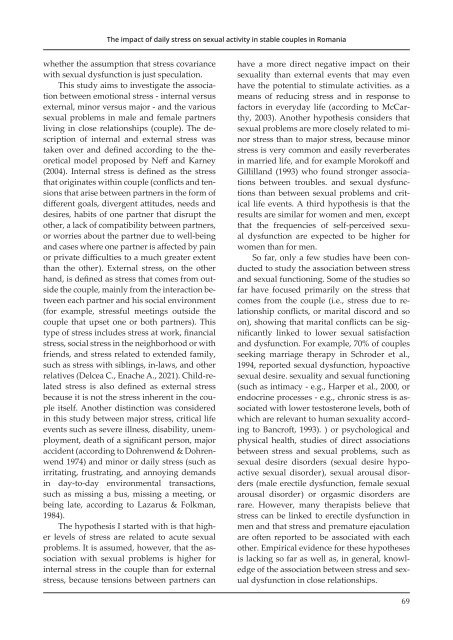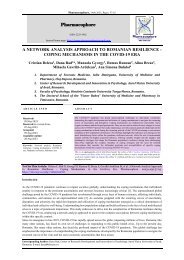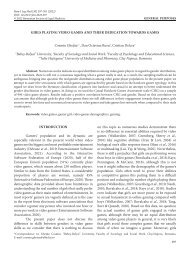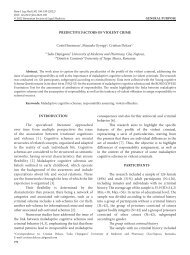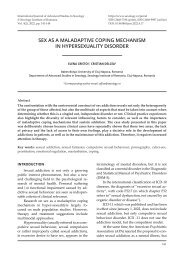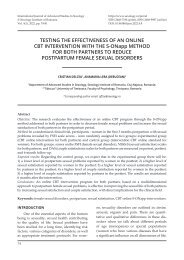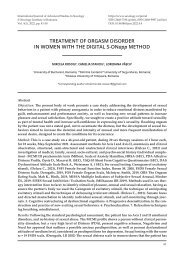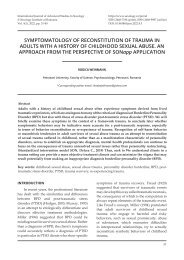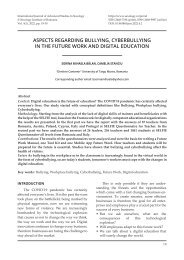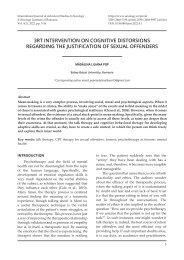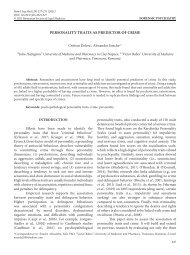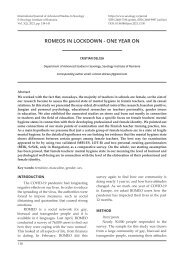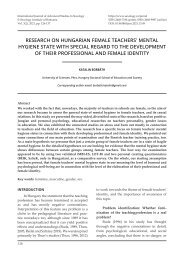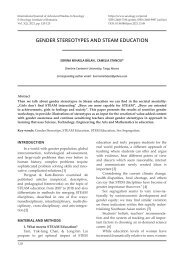THE IMPACT OF DAILY STRESS ON SEXUAL ACTIVITY IN STABLE COUPLES IN ROMANIA
Purpose: This study addresses the issue of how stress is related to sexual problems among women and men in close relationships (we considered stable couples). Psychological symptoms, relationship quality, daily internal stress (meaning, stress that comes from the couple, such as conflicts, concern for the partner), daily external stress (meaning, stress that occurs outside the couple, such as stress at work, stressful relatives and so on) were examined for their association with various sexual problems. Method: The study included 38 couples participating in this study, chosen at random from a sample of sexually active couples. Online questionnaires were used. Results: The results so far support the hypotheses that 1) there is an incremental effect or stress on sexual problems, controlling psychological symptoms and the quality of the relationship and that 2) it is primarily internal daily stress. Emotional stress that is related to sexual problems, especially hypoactive sexual desire in women and men, sexual aversion in women, vaginismus in women and premature ejaculation in men. Conclusions: Our findings indicate that the treatment of these sexual problems should address relationship issues, including a focus on helping individuals to improve their stress management skills in their relationship. Inner stress plays a key role in sexual behavior, this study once again highlights the fact that better communication as a couple, relaxation and finding specific copying methods are a good remedy, but more studies are needed to demonstrate effectiveness. them.
Purpose: This study addresses the issue of how stress is related to sexual problems among women and
men in close relationships (we considered stable couples). Psychological symptoms, relationship quality,
daily internal stress (meaning, stress that comes from the couple, such as conflicts, concern for the partner),
daily external stress (meaning, stress that occurs outside the couple, such as stress at work, stressful
relatives and so on) were examined for their association with various sexual problems.
Method: The study included 38 couples participating in this study, chosen at random from a sample of sexually active couples. Online questionnaires were used.
Results: The results so far support the hypotheses that 1) there is an incremental effect or stress on sexual
problems, controlling psychological symptoms and the quality of the relationship and that 2) it is primarily
internal daily stress. Emotional stress that is related to sexual problems, especially hypoactive sexual
desire in women and men, sexual aversion in women, vaginismus in women and premature ejaculation
in men.
Conclusions: Our findings indicate that the treatment of these sexual problems should address relationship
issues, including a focus on helping individuals to improve their stress management skills in their
relationship. Inner stress plays a key role in sexual behavior, this study once again highlights the fact that better communication as a couple, relaxation and finding specific copying methods are a good remedy, but more studies are needed to demonstrate effectiveness. them.
You also want an ePaper? Increase the reach of your titles
YUMPU automatically turns print PDFs into web optimized ePapers that Google loves.
The impact of daily stress on sexual activity in stable couples in Romania<br />
whether the assumption that stress covariance<br />
with sexual dysfunction is just speculation.<br />
This study aims to investigate the association<br />
between emotional stress - internal versus<br />
external, minor versus major - and the various<br />
sexual problems in male and female partners<br />
living in close relationships (couple). The description<br />
of internal and external stress was<br />
taken over and defined according to the theoretical<br />
model proposed by Neff and Karney<br />
(2004). Internal stress is defined as the stress<br />
that originates within couple (conflicts and tensions<br />
that arise between partners in the form of<br />
different goals, divergent attitudes, needs and<br />
desires, habits of one partner that disrupt the<br />
other, a lack of compatibility between partners,<br />
or worries about the partner due to well-being<br />
and cases where one partner is affected by pain<br />
or private difficulties to a much greater extent<br />
than the other). External stress, on the other<br />
hand, is defined as stress that comes from outside<br />
the couple, mainly from the interaction between<br />
each partner and his social environment<br />
(for example, stressful meetings outside the<br />
couple that upset one or both partners). This<br />
type of stress includes stress at work, financial<br />
stress, social stress in the neighborhood or with<br />
friends, and stress related to extended family,<br />
such as stress with siblings, in-laws, and other<br />
relatives (Delcea C., Enache A., 2021). Child-related<br />
stress is also defined as external stress<br />
because it is not the stress inherent in the couple<br />
itself. Another distinction was considered<br />
in this study between major stress, critical life<br />
events such as severe illness, disability, unemployment,<br />
death of a significant person, major<br />
accident (according to Dohrenwend & Dohrenwend<br />
1974) and minor or daily stress (such as<br />
irritating, frustrating, and annoying demands<br />
in day-to-day environmental transactions,<br />
such as missing a bus, missing a meeting, or<br />
being late, according to Lazarus & Folkman,<br />
1984).<br />
The hypothesis I started with is that higher<br />
levels of stress are related to acute sexual<br />
problems. It is assumed, however, that the association<br />
with sexual problems is higher for<br />
internal stress in the couple than for external<br />
stress, because tensions between partners can<br />
have a more direct negative impact on their<br />
sexuality than external events that may even<br />
have the potential to stimulate activities. as a<br />
means of reducing stress and in response to<br />
factors in everyday life (according to McCarthy,<br />
2003). Another hypothesis considers that<br />
sexual problems are more closely related to minor<br />
stress than to major stress, because minor<br />
stress is very common and easily reverberates<br />
in married life, and for example Morokoff and<br />
Gillilland (1993) who found stronger associations<br />
between troubles. and sexual dysfunctions<br />
than between sexual problems and critical<br />
life events. A third hypothesis is that the<br />
results are similar for women and men, except<br />
that the frequencies of self-perceived sexual<br />
dysfunction are expected to be higher for<br />
women than for men.<br />
So far, only a few studies have been conducted<br />
to study the association between stress<br />
and sexual functioning. Some of the studies so<br />
far have focused primarily on the stress that<br />
comes from the couple (i.e., stress due to relationship<br />
conflicts, or marital discord and so<br />
on), showing that marital conflicts can be significantly<br />
linked to lower sexual satisfaction<br />
and dysfunction. For example, 70% of couples<br />
seeking marriage therapy in Schroder et al.,<br />
1994, reported sexual dysfunction, hypoactive<br />
sexual desire. sexuality and sexual functioning<br />
(such as intimacy - e.g., Harper et al., 2000, or<br />
endocrine processes - e.g., chronic stress is associated<br />
with lower testosterone levels, both of<br />
which are relevant to human sexuality according<br />
to Bancroft, 1993). ) or psychological and<br />
physical health, studies of direct associations<br />
between stress and sexual problems, such as<br />
sexual desire disorders (sexual desire hypoactive<br />
sexual disorder), sexual arousal disorders<br />
(male erectile dysfunction, female sexual<br />
arousal disorder) or orgasmic disorders are<br />
rare. However, many therapists believe that<br />
stress can be linked to erectile dysfunction in<br />
men and that stress and premature ejaculation<br />
are often reported to be associated with each<br />
other. Empirical evidence for these hypotheses<br />
is lacking so far as well as, in general, knowledge<br />
of the association between stress and sexual<br />
dysfunction in close relationships.<br />
69


